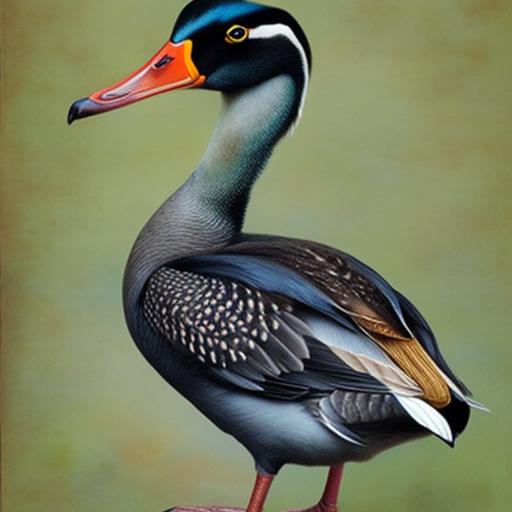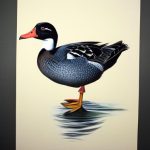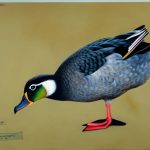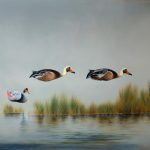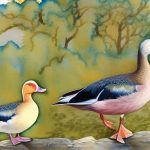Black duck breeds are a group of waterfowl known for their distinctive black plumage and unique characteristics. These ducks are a popular choice for both domestic and wild waterfowl enthusiasts due to their striking appearance and adaptable nature. Black duck breeds are found in various parts of the world, and they have been bred for different purposes, including meat production, egg laying, and ornamental purposes. These ducks are known for their hardiness and ability to thrive in a variety of environments, making them a popular choice for both experienced and novice duck owners. In this article, we will explore the characteristics, varieties, history, care, and conservation efforts of black duck breeds, as well as their potential as pets.
Key Takeaways
- Black duck breeds are a popular choice for poultry enthusiasts due to their unique characteristics and history.
- Black ducks are known for their glossy black feathers, orange legs, and dark brown eyes.
- There are several different varieties of black duck breeds, including the Cayuga, East Indie, and Swedish Black duck.
- Black duck breeds have a rich history and are believed to have originated in Asia before spreading to Europe and America.
- Proper care and maintenance of black duck breeds includes providing a suitable living environment, balanced diet, and regular health check-ups.
Characteristics of Black Ducks
Black duck breeds are known for their striking black plumage, which sets them apart from other duck breeds. They have a sleek and elegant appearance, with a glossy black coat that shimmers in the sunlight. Their beaks are typically a dark color, and their legs and feet are also dark, adding to their overall striking appearance. Black ducks are medium-sized waterfowl, with a sturdy build and a slightly elongated body. They have a strong and streamlined shape, which allows them to move gracefully through the water. These ducks are known for their alert and curious nature, and they are often seen foraging for food in ponds, lakes, and marshes. Black ducks are also known for their distinctive quacking sound, which is a common feature of their vocalizations. Overall, black duck breeds are known for their unique appearance, hardy nature, and adaptability to various environments.
Black ducks come in various varieties, each with its own unique characteristics and traits. Some of the most popular varieties of black duck breeds include the Cayuga duck, East Indies duck, and Black Swedish duck. The Cayuga duck is known for its iridescent greenish-black plumage, which can appear almost beetle-like in the sunlight. This variety is also known for its friendly and docile nature, making it a popular choice for backyard enthusiasts. The East Indies duck is another popular variety of black duck breed, known for its small size and striking black plumage. This variety is also known for its excellent foraging abilities and adaptability to various environments. The Black Swedish duck is a larger variety of black duck breed, known for its glossy black plumage and white bib on its chest. This variety is also known for its calm and friendly disposition, making it a popular choice for both backyard enthusiasts and commercial breeders. Overall, the different varieties of black duck breeds offer a range of unique characteristics and traits, making them a popular choice for waterfowl enthusiasts.
History and Origins of Black Duck Breeds
The history of black duck breeds dates back centuries, with evidence of their existence found in various parts of the world. The exact origins of black duck breeds are not well-documented, but it is believed that they have been bred for various purposes throughout history. Black ducks have been used for meat production, egg laying, and ornamental purposes in different cultures and regions. They have also been valued for their adaptability to various environments and their ability to thrive in both domestic and wild settings. The exact origins of specific black duck varieties, such as the Cayuga duck, East Indies duck, and Black Swedish duck, are also not well-documented, but it is believed that these varieties have been bred for specific traits and characteristics over time. Overall, the history and origins of black duck breeds are rich and varied, with evidence of their existence found in different parts of the world.
Care and Maintenance of Black Duck Breeds
Caring for black duck breeds requires attention to their specific needs and requirements. These ducks thrive in environments with access to water for swimming and foraging, so providing a pond or water source is essential for their well-being. Black ducks also require a balanced diet that includes a mix of commercial waterfowl feed, fresh greens, and access to insects and other natural foods. It is important to provide shelter and protection from predators, as well as regular veterinary care to ensure their health and well-being. Additionally, maintaining clean living conditions and providing ample space for exercise are important aspects of caring for black duck breeds. Overall, providing proper care and maintenance for black duck breeds requires attention to their specific needs and ensuring that they have access to the resources they need to thrive.
Black Duck Breeds as Pets
Black duck breeds can make wonderful pets for those who have the space and resources to care for them properly. These ducks are known for their friendly and curious nature, making them enjoyable companions for waterfowl enthusiasts. They can also be trained to some extent and can develop strong bonds with their human caretakers. However, it is important to note that black duck breeds require ample space to roam and access to water for swimming and foraging. They also require regular care and maintenance to ensure their health and well-being. For those who are able to provide the necessary care and resources, black duck breeds can make delightful pets that bring joy and entertainment to their owners.
Conservation Efforts for Black Duck Breeds

Conservation efforts for black duck breeds are important to ensure the preservation of these unique waterfowl species. Habitat loss, pollution, hunting, and other factors have contributed to the decline of wild black duck populations in some regions. Conservation organizations and wildlife agencies work to protect the habitats of black ducks and implement measures to ensure their survival in the wild. Additionally, efforts to preserve genetic diversity in domestic black duck breeds are also important to maintain healthy populations and prevent inbreeding. By raising awareness about the importance of preserving black duck breeds and supporting conservation efforts, we can help ensure the long-term survival of these unique waterfowl species for future generations to enjoy.
If you’re interested in learning more about black duck breeds, you might also want to check out this informative article on what to feed ducks. Understanding the dietary needs of ducks is essential for their health and well-being, and this article provides valuable insights into the best feeding practices for these delightful waterfowl.
FAQs
What are the different breeds of black ducks?
There are several breeds of black ducks, including the Black Swedish, Cayuga, and East Indies.
What are the characteristics of black ducks?
Black ducks are known for their dark plumage, which can range from a deep black to a dark greenish hue. They also have orange or dark brown bills and legs.
What is the average size of black ducks?
Black ducks are medium-sized ducks, with an average length of 20-28 inches and a wingspan of 30-40 inches.
What is the temperament of black ducks?
Black ducks are generally calm and friendly birds, making them suitable for backyard or farm environments.
What type of habitat do black ducks prefer?
Black ducks are typically found in freshwater habitats such as ponds, marshes, and streams. They also prefer areas with plenty of vegetation for nesting and foraging.
What do black ducks eat?
Black ducks are omnivorous and feed on a variety of foods, including aquatic plants, insects, small fish, and crustaceans.
Are black ducks good for egg production?
Black ducks are not known for their egg production, as they typically lay fewer eggs compared to other duck breeds. However, they are still valued for their meat and as pets.
Meet Walter, the feathered-friend fanatic of Florida! Nestled in the sunshine state, Walter struts through life with his feathered companions, clucking his way to happiness. With a coop that’s fancier than a five-star hotel, he’s the Don Juan of the chicken world. When he’s not teaching his hens to do the cha-cha, you’ll find him in a heated debate with his prized rooster, Sir Clucks-a-Lot. Walter’s poultry passion is no yolk; he’s the sunny-side-up guy you never knew you needed in your flock of friends!

